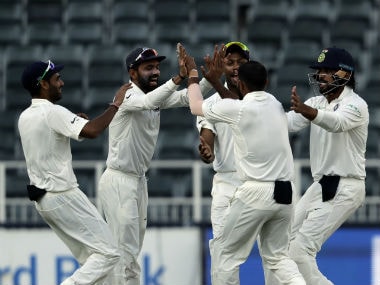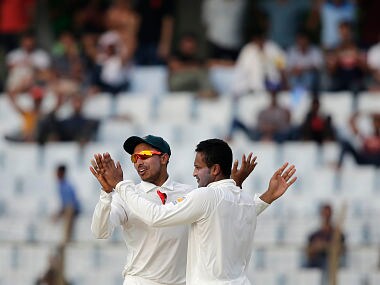India vs South Africa: Lessons learnt from gruelling tour stands Virat Kohli and Co in good stead for future battles
As a young team led by a young and improving captain, Virat Kohli's men are bound to walk away as better cricketers at the end of the India-South Africa Test series.
Rajesh Tiwary, Jan,28 2018
- ICC Under-19 World Cup, 2018 SL Vs WI Sri Lanka Under-19 beat West Indies Under-19 by 3 wickets
- ICC Under-19 World Cup, 2018 ENG Vs BAN Bangladesh Under-19 beat England Under-19 by 5 wickets
- ICC Under-19 World Cup, 2018 ZIM Vs CAN Zimbabwe Under-19 beat Canada Under-19 by 138 runs
- ICC Under-19 World Cup, 2018 SA Vs NZ South Africa Under-19 beat New Zealand Under-19 by 73 runs
- ICC Under-19 World Cup, 2018 PNG Vs KEN Kenya Under-19 beat Papua New Guinea Under-19 by 14 runs
| Rank | Team | Points | Rating |
|---|---|---|---|
| 1 | India | 5313 | 121 |
| 2 | South Africa | 4484 | 115 |
| 3 | Australia | 4174 | 104 |
| 4 | New Zealand | 3489 | 100 |
| 5 | England | 4829 | 99 |
| 6 | Sri Lanka | 4058 | 94 |
| Rank | Team | Points | Rating |
|---|---|---|---|
| 1 | South Africa | 6386 | 120 |
| 2 | India | 6680 | 119 |
| 3 | England | 6708 | 116 |
| 4 | New Zealand | 6550 | 115 |
| 5 | Australia | 6310 | 113 |
| 6 | Pakistan | 4875 | 96 |
| Rank | Team | Points | Rating |
|---|---|---|---|
| 1 | New Zealand | 2508 | 125 |
| 2 | Pakistan | 3097 | 124 |
| 3 | India | 3385 | 121 |
| 4 | England | 2029 | 119 |
| 5 | West Indies | 2538 | 115 |
| 6 | South Africa | 2238 | 112 |





Despite ending 2017 as the number one Test team in the world, Team India faced more questions marks than accolades for their achievement. India's success was attributed by some of their critics to playing mostly at home or touring countries like Sri Lanka and West Indies with home-like conditions. It's an unfortunate scrutiny that teams from the subcontinent always have to face when they are doing well. Unless you can prove yourself in alien conditions, unforgiving experts and even fans will not consider you worthy of their praise.
The road to South Africa was always going to be a tough one. It's a country where subcontinent batsmen have always struggled. The recently concluded series, as it turned out was no exception either. Team India fought back admirably in the third Test and managed to salvage some pride on what had otherwise been a forgettable tour for their batsmen. Still, as a young team led by a young and improving captain, Kohli's men are bound to walk away as better cricketers at the end of the series.
The Indians celebrate after pulling off a 63-run win over South Africa on Day 4 of the third Test. AP
Warm-up games may be optional, but preparation is essential
One of the biggest lessons learnt from the series was how a lack of preparation before the first Test could hurt the team. Kohli may have been right in refusing the solitary warm-up game and choosing instead to do intensive training when India arrived in South Africa, but preparation doesn't really mean playing warm-up games before the tour.
Practice matches on tours don't have the same competitive edge that they used to have once upon a time. Touring teams used to play against strong first-class teams on testing pitches to give them a taste of what lies ahead. These days, in an attempt to further extend the home advantage, cricket boards string up a half-strength teams and provide pitches that are usually a far cry from the decks that will be rolled out when the actual Test series starts.
India can take a leaf out of Australia's method where they organised a preparatory camp in Dubai before arriving in India for their series last year. Even without the help of host cricket board, it's possible for touring teams to create conditions that you are going to face in the Test matches, to call in experts of various departments of the game, and do a week or two of rigorous training to get the required conditioning for the Test series.
One area where India can surely use some practice before touring a country like South Africa is slip catching. When the team plays Test matches in India, fast bowlers usually get two fielders in the slip cordon. In South Africa, the team suddenly needs to cultivate at least five solid fielders who — aside from having the skill to take those catches flying through to the slip cordon — can concentrate in the slips pretty much for an entire day and be ready for that one chance after hours of waiting.
Play horses for courses, but trust the top horse on every course
Man-management has been a much-discussed term in this Indian team over the last few months. Ravi Shastri was roped in as coach specifically for this skill. One of the essential qualities in this role at any level is always knowing and backing your top performers.
In South Africa, at times the team seemed unsure of who their top performers are in the Test arena. A captain who is flexible in his mind about team composition and a squad that is always prepared to do the job whenever called upon is a great asset, but this shouldn't come at the cost of having an established core that is in the team for every game. Apart from turning in key performances, this core is also the think tank of the team that can work with the captain on team strategy.
Playing four proper fast bowlers at the Wanderers pitch in the third Test was a big win for the horses-for-courses policy. Some captains in the past would have been wary of going into a Test match without a specialist spinner, but this team now has the confidence and fast bowling riches to do that.
The win at Johannesburg will also make other teams think twice before preparing pitches that provide too much assistance to fast bowlers in an attempt to blow away the Indian batting. Even the Cape Town Test could have gone in India's favour if they had played better in some key moments. Seaming pitches test India, but they also offer them a great chance to give the hosts a taste of their own medicine.
Be prepared to play the waiting game
There is a quote from Bruce Lee in the book Zen in the Martial Arts by Joe Hyams where he says, "The pause in the middle of action is one of my secrets." He calls it "stop action". He further explains, "When I attack, I always try to pause — stop action — to study my opponent and his reactions before going into action again." This stop action is what separates great martial artists from the good one. It's also a skill that is useful in almost any sport.
When things aren't going your way, it is always good to try and slow the game down to take stock of the situation while you figure out your next moves. It's something Kohli has become good at over the years.
Apart from the obvious lessons, there will be a number of mental notes that everyone in the squad will be carrying forward from the tour. Each player individually will walk out with a better knowledge of his game and better awareness of what works for him.
With a captain who trusts his instincts despite all the external noise, and a rich talent pool to pick from, Team India will now be hoping to use this win as a launching pad for producing even better results when they tour England and Australia later this year.
Published Date:Jan 28, 2018
| Updated Date: Jan 28, 2018
Also See
India vs South Africa: Visitors need to invest more faith in Bhuvneshwar Kumar, their most potent new-ball weapon
India vs South Africa: Competitive pace attack biggest gain for Virat Kohli and Co despite series loss
India vs South Africa: Virat Kohli's joust with the press uncalled for, skipper must introspect team's performance